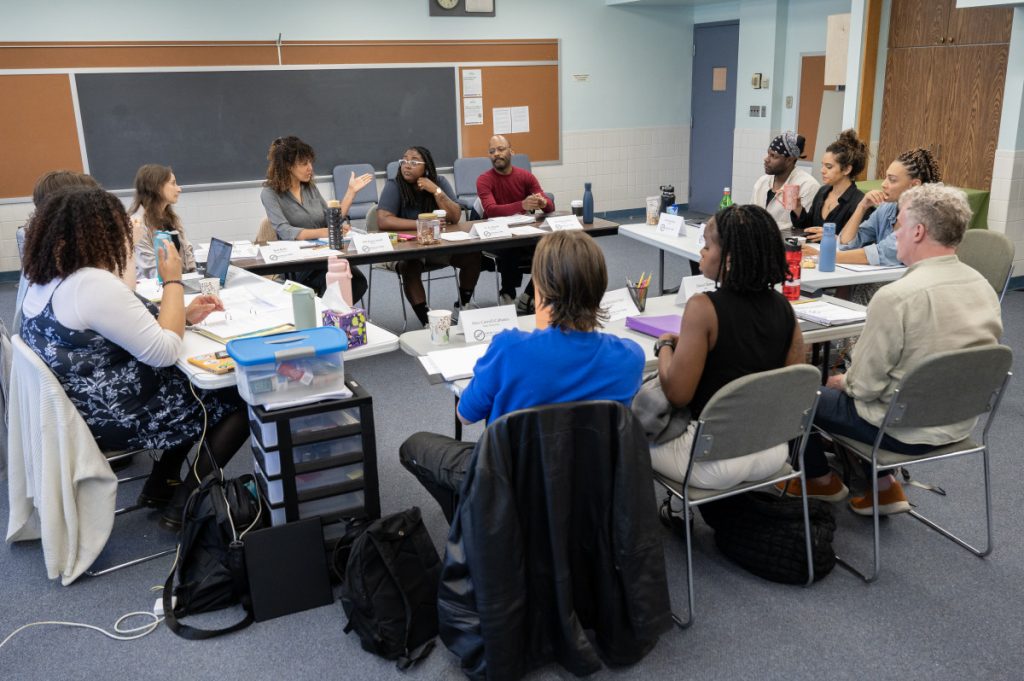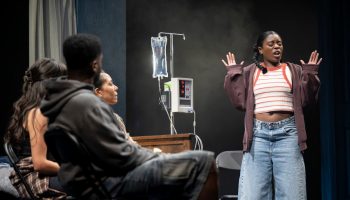
Tell Me You’re Dying (or the trial of millicent bonhomme) playwright C.A. Johnson, center left, Producting Artistic Director Jade King Carroll, left, and dramaturg Otis Ramsey-Zoe, right, work with the cast during a table read Thursday in Turner Community Center.
Themes of love, loss and community are infused into Chautauqua Theater Company’s first New Play Workshop of the season, Tell Me You’re Dying (or the trial of millicent bonhomme).
Commissioned by CTC, the script by playwright C.A. Johnson and dramaturgy by Otis Ramsey-Zoe, enters around five people who are meeting for their weekly support group as an apocalypse ravages the world around them. As they try to make sense of their new fate, they form connections with each other and wonder if they have the ability, and the time, to change.
“Even in a world where death is not just a fact, it’s around the corner, we are still so invested in living,” Johnson said.
Tell Me You’re Dying will have its first public workshop at 7:30 p.m. tonight in Bratton Theater; two more performances follow this weekend.
When Producing Artistic Director Jade King Carroll, who is directing the workshop performances, asked Johnson if CTC could commission her as a playwright, she was filled with excitement.
Johnson was in residence for several days on the grounds last season; during that time, she wrote about the first 50 pages of the play. When her creative time to write at Chautauqua was up, she spent the next six months finishing the story.
When she submitted the first draft of the play, Carroll immediately knew it would be a New Play Workshop.
Since 2020, Johnson has been adamantly opposed to writing a play about the pandemic, since many other playwrights have done so. But she felt that this story needed to be told, and for one reason or another, it was calling to her.
“I think that this one found me,” she said.
While Tell Me You’re Dying isn’t directly about COVID-19, it is about an unnamed plague happening beyond the characters’ walls that is “vaguely zombie-like.” But as the world is coming to an end outside, Johnson said the real story is about what is happening to the characters inside the walls of their support group. The existential and emotional collide — Johnson’s alternative title was The Trial of Millicent Bonhomme — as the character of Millicent experiences a slow, internal trial as she wonders if she can live in a world without her wife.
“This is a plague that takes people out very slowly, and so they are all living inside the fact of their mortality, but I think that Millicent is living inside the fact of her emotional mortality,” she said. “Like, ‘This world is eating away at the core of me and I have to decide, even if my time here has been cut short, if I want it, if I know how to do it and if I can handle it; if I can handle the world where my wife isn’t in it.’”
The pandemic taught us countless lessons, including about how we spend our time, who are the people we care about most and what we miss when it’s taken from us, Johnson said. She was also inspired by weekly calls her wife had with childhood best friends in 2020 when they were confined to their homes.

“I was sitting in another room and listening to them talk,” Johnson said, “and I thought, ‘Look at these people who all speak the same language, because they met as girls; (they) all have very different careers, don’t even live in the same place anymore, but this crazy version of the world reminded them what community was and what deep, old love was.”
Originally from Louisiana, Johnson holds an MFA in dramatic writing from New York University and has written numerous plays and scripts for television and film. Growing up, she fell in love with books and her mother would often find her hiding in a closet reading.
“I think reading is the gateway for everyone,” she said. “I was the president of the library club in middle school and I loved books. I think that love of storytelling very naturally led to wanting to tell stories.”
During the school day, she would scribble down poems, and by high school, she was writing a vampire novella she joked that she’s glad she lost. Her high school teacher inspired her to start writing plays when he recognized her gift and gave her copies of August Wilson’s Fences and Lorraine Hansberry’s A Raisin in the Sun.
When Johnson finished reading them, she was changed.
“Once I had the bug, it never went away,” she said.
Now a Brooklyn-based playwright who recently joined New Dramatists, a playwriting organization in New York City, she is fascinated by the “myth of the strong woman” and telling stories tackling issues such as self-actualization, giving love to others, and abandonment.
“I think there is something to be said about the work of being a woman that is so endlessly interesting to me — and I often see it misrepresented on stages — (representations) that are not lived in a way that feels true to the women I know,” she said.
In Tell Me You’re Dying, Johnson wanted to build on telling the stories of women while incorporating concepts of loving, losing and holding onto the things and people that matter to us most.
During a first draft reading of her play with a few actor friends, she began to understand that, even as the characters are dying, they also still want to feel, experience and love.
“Once I was hearing that first draft, I was like, ‘Wow, I feel like these people, outside of just Millicent, are all trying to articulate to one another, ‘Every day, I know that I’m dying and I also still want. I know that I’m dying and I also still love. I know that I’m dying and I also still need,’” she said.
As Johnson brings her story to life with Carroll and CTC’s guest and conservatory actors, she can’t wait to workshop scenes and collaborate with the company.
“The real gift of actors is it doesn’t matter what you imagine in your head; they have to make it real,” she said.
While audiences experience the laughs and cries that Tell Me You’re Dying may bring, Johnson hopes that people will remember the community around them.
“I want us all to remember to slow down,” she said. “I want us all to remember to look into the eyes of the person across the aisle and say, ‘Hey, I love you,’ and have that love mean whatever it needs to mean.”




